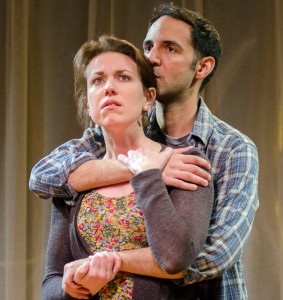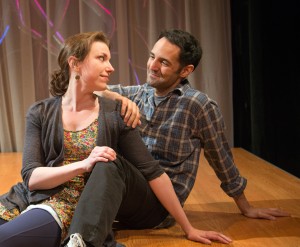Theater Review: “Lungs” — The Protocol of a Bittersweet Romance
Presence is the sense that the actors live in the here and now, every minute, every second they are on stage. And Liz Hayes and Nael Nacer do that in the New Rep production of Lungs.
Lungs by Duncan Macmillan. Directed by Bridget Kathleen O’Leary. Featuring Liz Hayes and Nael Nacer. Set and lights by Jen Rock. Costumes by Emily Woods Hogue. Sound by Ashan Gailus. Staged by the New Repertory Theatre at the Arsenal Center for the Arts, Black Box Theater, Watertown, MA, through March 10.
By Peter-Adrian Cohen

Actors with presence: Liz Hayes and Nael Nacer in LUNGS. Photo: Andrew Brilliant/ Brilliant Pictures.
What keeps a critic like myself coming back to the theater? It’s the expectation that, among the many evenings of solid craft, there will be one that utterly surprises, blows me away with its power, its throbbing life.
I am happy to report that Lungs is such a production.
When I heard the title and read the press-release I thought, A play about what? About having—no, not even having—about thinking about having a baby? I happen to be the father of a grown son—what could there be in such a play that I haven’t already lived? What could sustain me through the evening?
Well, the evening’s magic starts the moment the two actors enter—and I mean ENTER. Without hesitation they take charge of the stage, charming us with their presence, their irresistible energy. Presence? In the theater (as in real life), presence is a quality that attaches to persons of substance. In this play, the two actors radiate an inspiring self-confidence, a fearlessness vis-a-vis the audience. I mean vis-a-vis that ferocious, man-eating monster that, evening after evening, threatens the health and sanity of any actor daring to tame it. Presence, to me, means that these lion-tamers have a strength that comes from intensely lived lives, from dizzying hope and bone-jarring disappointments. But most importantly, presence is the sense that the actors live in the here and now, every minute, every second they are on stage.
Liz Hayes and Nael Nacer do not just have presence, they are a beautiful couple to look at. (The costumes support them in a flattering way. Emily Woods Hogue, the designer clearly knows the world, the characters she is designing for).
And though the casting of the play seems totally “natural,” there is, you know it, no such thing as “natural” in the theater—especially not what pretends to be exactly that. The casting of Hayes and Nacer could not be more fortunate: Because this play is as much about growing up as it is about becoming parents (which, in a way, are two sides of the same coin). At any rate, the playwright gives them plenty of growing to do: Their sense of self is being threatened at every turn. Any decision they make is immediately challenged by the fact that the opposite decision makes just as much sense. Wanting to be decent human beings is tested by the need to be a succeed and make money (especially now that they will have a baby.) Biology struggles with morality, love with jealousy. And the need to listen is in constant clinch with the need to be right and to be in charge.
Another obvious strength of this production is its dialogue: Broken, staccato sentences, often overlapping, always conflicting—the sort of disharmony you hear, every day, on the bus. And all in that 30-somethings language that has no form, that is all emotion.
Happily, director Bridget Kathleen O’Leary listens just as closely to these characters. There is no acting, only REACTING. As in a well-wrought piece of classical music, one of the characters starts a theme; the other expands, riffs on it. It all feels “simple” and “natural” but is, I already said it, neither: it is great craft. It is doing what is essential to drive the story forward, what is going to make all the difference.
Perhaps the most fortunate choice by this creative team is not to perform the play naturalistically. Changes of scene are done by a mere change of voice, by a change in position, and bingo: We’re in a different place, in a different moment.
We—the audience—are invited to supply from our imagination whatever is not there on stage. (And does not need to be). Even a puzzling, at first indecipherable, element of the set finally acquires meaning: What looks like a strange, inverted tree turns out to be blood vessels. Lit blood-red it becomes a placenta, sign of the new life in the making.
The romance of these two endearing characters ends bittersweet. But that too is in keeping with their hyperactive, scattered lives.

